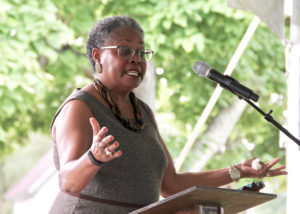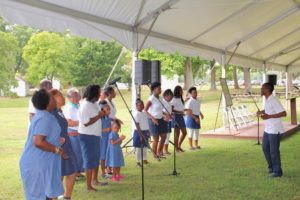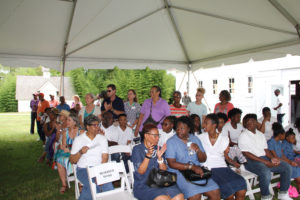UNESCO (The United Nations Educational, Scientific and Cultural Organization) designated August 23 as the International Day for the Remembrance of the Slave Trade and its Abolition. This year, Historic Sotterley hosted a public event on that day to honor the memories of those that perished and survived the trans-Atlantic slave trade. Sandra Coles-Bell, a descendant of a person enslaved at Sotterley, served as the emcee. She talks about her experience and contrasts it to her first visit to Sotterley.

My first visit to Sotterley Plantation, approximately two years ago, was surreal and private. I was alone with my 27-year-old daughter who had endured the drive from our home to Sotterley despite her becoming frequently car sick. I learned from my aunt in Charles County that I was a direct ancestor of one who was enslaved at the Sotterley Plantation. The following day, I made a trip to the plantation as I had learned that it was a National Historic Site by the U.S. National Park Services.
The first time when I pulled onto the grounds, I was overwhelmed with a ton of emotions: sadness for the history, joy for the discovery, and pain for the memories. I opted to only visit one place on the plantation, the slave cabin. I was so grateful to the late Ms. Agnes Kane Callum, who is also a direct descendant of one enslaved at Sotterley, for her diligence in working so hard to ensure the recognition of my ancestors and hers was done. (Callum arrived at Sotterley in the seventies, was a descendant of a person enslaved at Sotterley, served on the Board of Trustees, and is known for her genealogical work.) Despite the pain and suffering, I found great peace standing in the bare cabin, reading the placards and just knowing that my ancestors had placed their feet upon the earth below me. The tears were overwhelming and I was very grateful to see them come.

On this day, it was for a different occasion, to honor the UNESCO International Day for the Remembrance of the Slave Trade and its Abolition and I had been asked to be a part of it as a direct ancestor. It was my honor to have been asked to serve as the Master of Ceremonies. I stood there unable to speak, humbled by the tears and feeling the spirits of my ancestors. The bell tolled and I could hardly contain my tears as the peals felt so vital. This time, I was not alone, but rather in the company of so many who came forward to state the names of their ancestors. We listened to the moving music from the wonderful choir and felt a deep spirit of comradery.

I was particularly touched by the desire of the ancestors of the plantation owners coming forward to discuss their part in the history and being so grateful to have been accepted and loved during the event. There were many events planned for the day, for example, guided tours of the many houses and artifacts. With much regret, I had to leave to attend the funeral of a relative. Whether our relatives are living or deceased – our love for them and the desire to honor them never does.
The first time that I came to the Sotterley Plantation, I left a completely different person. I felt whole and complete for the first time in my life. On August 23, I became a part of something so unique and celebrated throughout the world. I am forever changed and forever humbled by the experience.
Maryland Humanities is proud to have funded this programming with a grant. Learn more about Historic Sotterley at www.sotterley.org. Disclaimer: The views and opinions expressed on our blog do not necessarily reflect the views or position of Maryland Humanities or our funders.

